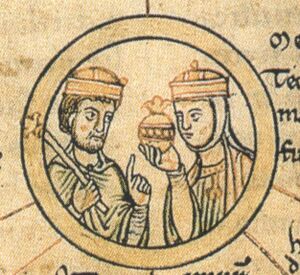Matilda of Ringelheim facts for kids
Quick facts for kids SaintMatilda |
|
|---|---|

King Henry and Matilda, detail from the Chronica sancti Pantaleonis, 12th century
|
|
| Born | c. 892 Enger, Saxony, East Francia |
| Died | 14 March 968 Quedlinburg, Saxony, Holy Roman Empire |
| Venerated in | Eastern Orthodox Church, Roman Catholic Church |
| Canonized | after 968 |
| Major shrine | Quedlinburg Abbey, Saxony-Anhalt, Germany |
| Feast | 14 March |
Matilda of Ringelheim (born around 892 – died March 14, 968) is also known as Saint Matilda. She was an important noblewoman from Saxony. In 909, she married Henry I. This made her the first Ottonian queen. Her oldest son, Otto I, later brought back the Holy Roman Empire in 962.
Matilda started many religious places and convents for women. People thought she was very religious, fair, and kind. We know a lot about her life from two special biographies about saints (called hagiographies) and a book called The Deeds of the Saxons.
Contents
Early Life and Family Connections
Matilda was born around the year 892. Her parents were Reinhild and Dietrich. Her father was a count in the Duchy of Saxony. This area was part of the Kingdom of Germany, which had been formed about 50 years earlier. Dietrich was a descendant of Widukind, a Saxon duke who fought against Charlemagne.
Matilda grew up at Herford Abbey in Saxony. Her grandmother, who was also named Matilda, raised her there. Matilda had three sisters: Amalrada, Bia, and Fridarun. Fridarun later married Charles III, who was the king of West Francia. Matilda also had a brother named Beuve. He later became Beuve II, a bishop.
Matilda had a niece named Fridarun. This niece married Count Wichmann the Elder. This marriage helped connect the Billung family with the Ottonian family. It also helped them get more land to the west.
Marriage to Henry I
In 909, when Matilda was 17, she married Henry. At that time, he was the Duke of Saxony. He later became the king of East Francia. Henry's first marriage had been ended before he married Matilda.
About 20 years later, in 929, Matilda received her dowry. A dowry was like a gift of land or money given to a wife. Henry gave her land in places like Quedlinburg, Pöhlde, Nordhausen, Grona, and Duderstadt.
As queen, Matilda was very interested in women's monasteries. People said her strong sense of fairness influenced the king's rule.
Matilda's Children
Matilda and King Henry had five children:
- Otto (912–973): He became the Holy Roman Emperor in 962.
- Henry (919/922–955): He became the Duke of Bavaria in 948.
- Bruno (925–965): He was chosen to be the Archbishop of Cologne in 953 and the Duke of Lorraine in 954.
- Hedwig (910–965/980): She married a duke from West Francia named Hugh the Great.
- Gerberga (around 913–968/969 or 984): She first married Gilbert, Duke of Lorraine. Later, she married the Carolingian king Louis IV of France.
Life as a Widow
King Henry died in 936 and was buried in Quedlinburg. In the same year, Queen Matilda started a convent there. A convent is a place where religious women live and pray. She lived there for many years and took care of her family's important history.
Quedlinburg Abbey became a very important place for prayer in the kingdom. It was also a place to remember important people who had died. Like other convents, Quedlinburg was a school for daughters of noble families. Some of these girls became abbesses, who were leaders of the convents. This helped their families stay powerful.
One of Matilda's own granddaughters, also named Matilda, became an abbess. She was the daughter of Otto I. In 966, after leading the convent for 30 years, Queen Matilda gave the responsibility to her granddaughter. This Matilda became the first abbess of the Quedlinburg convent.
Queen Matilda used her other resources to start more convents. She founded one in Enger in 947. Her last convent was in Nordhausen, started in 961.
Between 936 and 946, Matilda had a disagreement with her son Otto I. He claimed some of the land that King Henry I had given her as her dowry. This disagreement even led to her leaving for a short time. Otto's wife, Queen Eadgyth, helped them make peace. Matilda agreed to leave her wealth, and Otto forgave her.
This disagreement is still talked about today. To protect her legacy before she died in 968, Matilda got special permissions from the Pope for all her monasteries in eastern Saxony. However, after her death, her dowry passed to Theophanu, the wife of Otto II.
Death and Legacy
Queen Matilda died on March 14, 968, in the convent of Quedlinburg. She had been sick for a long time. She was buried next to her husband in Quedlinburg Abbey. Throughout her life, Matilda was dedicated to helping others and starting religious foundations. This is written about many times in two biographies about her. There is a special plaque honoring her at the Walhalla memorial in Germany.
Matilda is the patron saint of several churches and a hospital. These include the St. Mathilde church in Laatzen (Germany), the St. Mathilde church in Quedlinburg (Germany), the Melkite church in Aleppo (Syria), and the Mathilden-Hospital in Herford (Germany). Her special day, or feast day, is March 14.
See also
 In Spanish: Matilde de Ringelheim para niños
In Spanish: Matilde de Ringelheim para niños
- Saint Matilda of Ringelheim, patron saint archive
 | George Robert Carruthers |
 | Patricia Bath |
 | Jan Ernst Matzeliger |
 | Alexander Miles |

